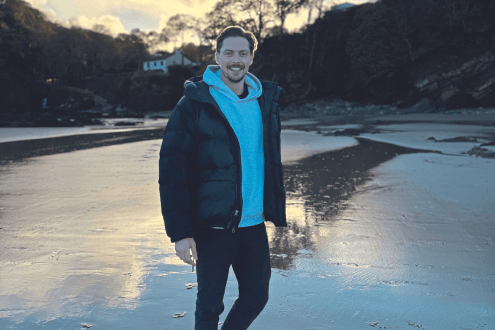Living positively: 3 ways to embrace a new mindset
Eleanor Tucker grew up believing that if something could go wrong, it would. Then she realised there wasn’t a storm on every horizon, and began to live differently

6 minute read
The man at the supermarket checkout asks, ‘Do you need another bag?’ Unwilling to fork out an extra 5p in return for more plastic, I shake my head and overload the one bag I have, squeezing in a carton of milk. Ten paces up the road and the bag splits, my shopping falling unceremoniously onto the pavement. ‘Typical,’ says a voice in my head.
Gathering up bananas and washing-up liquid, I pause and ask myself: ‘Is it really typical? Do bags typically break; does shopping typically end up on the pavement? Why did you say that?’ The answer comes easily: this narrative, the one that says the worst outcome is the one to expect, is what I grew up with. ‘Isn’t it always the way?’; ‘That’s Murphy’s Law’; ‘Expect the worst, and you won’t be disappointed!’ You get the pessimistic picture. The thing is, I don’t like this Murphy chap. Not only do I reject the idea that life is conspiring against me, I don’t think the belief that it does serves me particularly well.
I vividly recall, aged 15, going to the cinema with a boy I’d met on the school bus. I got new sandals for the occasion, which I think was one of the Indiana Jones films. They rubbed my feet raw and, on my return home, limping and bleeding, I was met with, ‘Well, that was bound to happen!’ The date was fun (some snogging in the back row), and I hadn’t cared much about the sandals rubbing but, after that comment, I felt a bit flat.
‘The most important decision we make is whether we believe we live in a friendly or hostile universe,’ said Albert Einstein, and I couldn’t agree more. But, as we all know, parting company with the beliefs and paradigms we’ve always known is no easy task. I decide, in order to lay this imaginary childhood friend – nay, enemy – to rest completely, I need expert advice.
Belief relief
I speak to life transformation coach Corinne Worsley, who agrees that expecting a negative outcome is not doing me any good. ‘There’s a part of our brain called the reticular activating system (RAS) that filters the billions of bits of data we’re bombarded with every day, according to the guidelines we give it, and those guidelines are based on our beliefs,’ she explains. ‘The RAS is always working to prove our beliefs right, so it seeks evidence to confirm our beliefs rather than challenge them (confirmation bias). If we believe in “Murphy’s Law”, we will be inundated with evidence to prove that belief right, and vice versa. The beauty is that a belief is simply a thought we think over and over again so, once we become aware of the thought, we can change it, create a new belief and start collecting new data to support that belief.’
So far, so logical. But let’s rewind. Why were my parents so fond of saying negative things in the first place? ‘It comes down to experiences, most likely in childhood, which have caused us to adopt that belief to protect ourselves from a perceived threat,’ Worsley tells me. ‘A belief in a universe that’s out to get you may be a protection mechanism trying to keep you safe from humiliation or vulnerability.’
My parents were war babies, born in the south of England. Perceived, and real, threats were commonplace, so I can see why they may have simply copied the attitude of adults around them. But, although our beliefs often mirror those of our parents until we’re adults, we then get to choose again. Not everyone picks a different mindset, but I did – slowly. In my teenage years, I thought that if you were in a hurry, the traffic would be bad; that it would rain on a bank holiday; that when you needed to use the phone box, it would have been vandalised… But, as I grew older, I felt this attitude didn’t quite fit. So I began to rephrase the words of that inner voice. Noticing it comes first and, once you do, you start to see how illogical it sounds: ‘Anything that can go wrong, will go wrong,’ and ‘Typical’ made me ask myself, ‘Why will it go wrong?’; ‘Why is it typical?’ Once I noticed the voice, and questioned it, I began to notice it less often.
As I matured emotionally, a new mindset emerged, which felt like a much better fit. The day I first noticed it, I was on the way to a picnic in a botanic garden with a friend, Ali. We had young children in tow – about five between us – and, as we stopped at a cafe to buy lunch on the way, it started to rain.
Shine on my parade
Ali suggested we change plans. ‘It’s just a shower,’ I said, hopefully. The queue progressed slowly, both of us holding freshly baked rolls ready to be filled with tuna mayo. The smell of the bread drifted up and, excited at the prospect of al fresco carbs, I decided that when we stepped outside again, the rain would have stopped. Ali, conversely, tensely googled alternative, undercover venues on her phone. Ten minutes later, we spilled out onto the pavement into glorious sunshine! I’m clearly not in charge of the weather, but this was a game changer for me, and I actively altered my perspective.
It turns out that believing things may turn out fine, or even the occasional moment of pronoia (trusting that the universe is actually working in my favour) doesn’t hurt one bit. It makes things a lot easier, as it had during that potentially anxious wait with expectant under-fives. Whether it’s true or not, I don’t care. It makes me calmer, happier and even braver because, by imagining the best will happen, it’s much easier to dive in. Think of a presentation at work… If you don’t believe you’ll forget what you have to say, or that your PowerPoint will go wrong, how much more courageous will you feel beforehand?
Murphy still pops up, like he did when my shopping bag broke, which got me thinking: what is the perceived benefit of uttering negative statements – for myself, or anyone else? Worsley says that for different people, there are different reasons. ‘One is that if we believe that no matter what we do, the universe is conspiring against us, we can blame our circumstances on other people and outside forces.’ There are other reasons too, she explains: ‘We may get more attention than if life started working out for us. Sometimes, we’re attached to our struggle, because it’s been with us for so long, it’s part of our self-image. Or, maybe we’d rather stick with certain misery than reach for uncertain happiness; and, by blaming Murphy, we avoid the discomfort of owning our own failures.’
The let-down loop
But at what cost? By repeating this negative internal dialogue, surely we’re missing something? ‘We certainly are,’ says Worsley. ‘Believing that when bad things happen, it’s “typical”, and the world is out to get you, you live life permanently disappointed; you miss out on opportunities, joy, meaning and love.’ If this isn’t a reason to observe the language I use, both in my head and out loud, then I don’t know what is. But what replaces ‘Typical’ and, ‘That was bound to happen’? Words like, ‘Never mind,’ and ‘I’m sure that won’t happen again.’ Or, to put it another way: hope. Hope that we can have an effect on our own lives; that we are in control.
‘Hope is also linked to a growth mindset,’ Worsley continues. ‘If we believe everything about us and our life is fixed, then we have no hope and we are powerless to make changes. However, this has been proven to be untrue. By adopting a growth mindset and believing we can learn and change, we become more hopeful, and therefore we have more power over our own destiny.’
As I walk back from the supermarket, cradling a bunch of bananas, I realise the washing-up liquid has broken along with the bag, and I left a lemon-scented trail all the way home. But, do you know what? That was a one-off. Not typical at all. Pretty funny, actually.
Image: Getty








